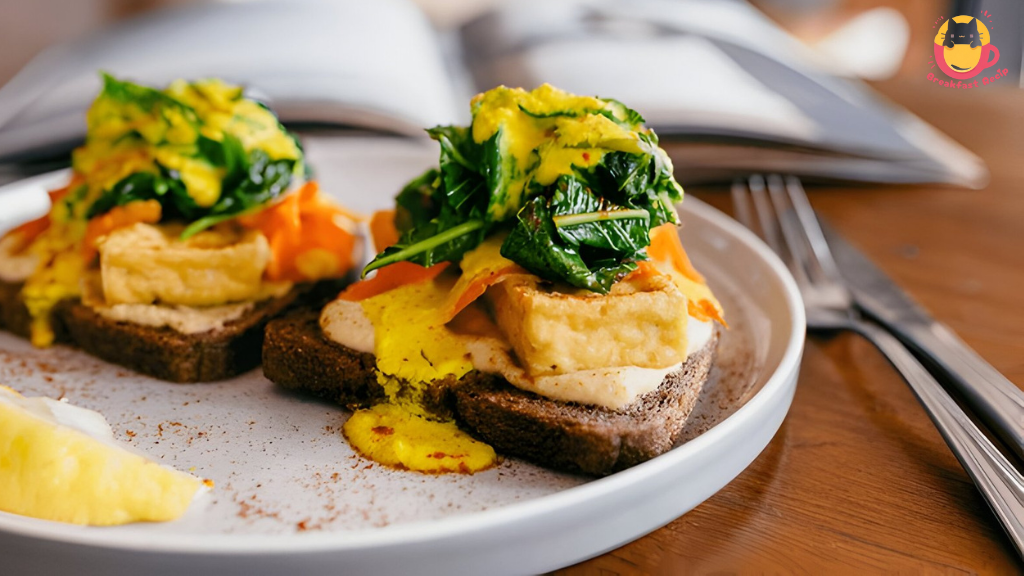Starting your day with a healthy breakfast is key for anyone who cares about their health. A good breakfast gives you the energy and nutrients you need. It also boosts your overall health and well-being. In this article, I’ll share expert tips and tasty recipes to help you understand what makes a healthy breakfast.
Key Takeaways
- A healthy breakfast should include a balance of protein, fiber, complex carbohydrates, and healthy fats to keep you energized and satisfied throughout the morning.
- Eating a nutritious breakfast can improve energy levels, cognitive function, and overall health.
- Incorporating high-protein foods, whole grains, fruits, and vegetables into your breakfast can provide a well-rounded and balanced start to the day.
- Portion control is key to maintaining a healthy breakfast, as it helps prevent overeating and ensures you’re getting the right amount of nutrients.
- Complex carbohydrates like oatmeal and whole grain breads are excellent foundations for a balanced breakfast that will keep you feeling full and energized.
Understand the Benefits of Eating a Nutritious Morning Meal
Eating a balanced breakfast can fuel your day and support your well-being. It boosts your energy and improves your brain function. The right mix of nutrients in your morning meal can greatly impact how you feel and perform.
Improved Energy Levels
Starting your day with a nutritious breakfast can make you feel more energized. Foods like oatmeal or whole-grain toast give you energy that lasts. Adding protein-rich foods, such as eggs or Greek yogurt, helps keep your energy levels stable.
Better Cognitive Function
Breakfast is key for both physical and mental energy. Studies show that eating a nutritious breakfast improves memory and concentration. The benefits of eating breakfast come from the glucose it provides and the energy-boosting foods that nourish your brain function.
Knowing the morning meal benefits helps you make better choices. Adding a benefits of eating breakfast to your routine can improve your energy, focus, and overall well-being.
“Breakfast is the most important meal of the day, providing you with the necessary nutrients and energy to tackle the day ahead.”
Incorporate Protein-Rich Foods for a Balanced Start
Starting your day with a protein-rich breakfast boosts your energy and keeps you full. Protein helps keep muscles strong, improves brain function, and controls hunger. It’s key for a healthy morning.
There are many ways to add protein-rich foods to your breakfast. You can choose from eggs, Greek yogurt, lean meats, and plant-based proteins. Each option is tasty and good for you.
- Scrambled eggs with spinach and whole-grain toast
- Greek yogurt topped with berries and a sprinkle of chia seeds
- Avocado toast with poached eggs
- Overnight oats made with milk or plant-based milk and peanut butter
- Smoothie bowl with protein-rich ingredients like protein powder, nut butter, and Greek yogurt
Adding these protein-rich foods to your high-protein breakfast keeps you full longer. You’ll also get more energy and better brain function. Plus, it’s great for those trying to lose weight.
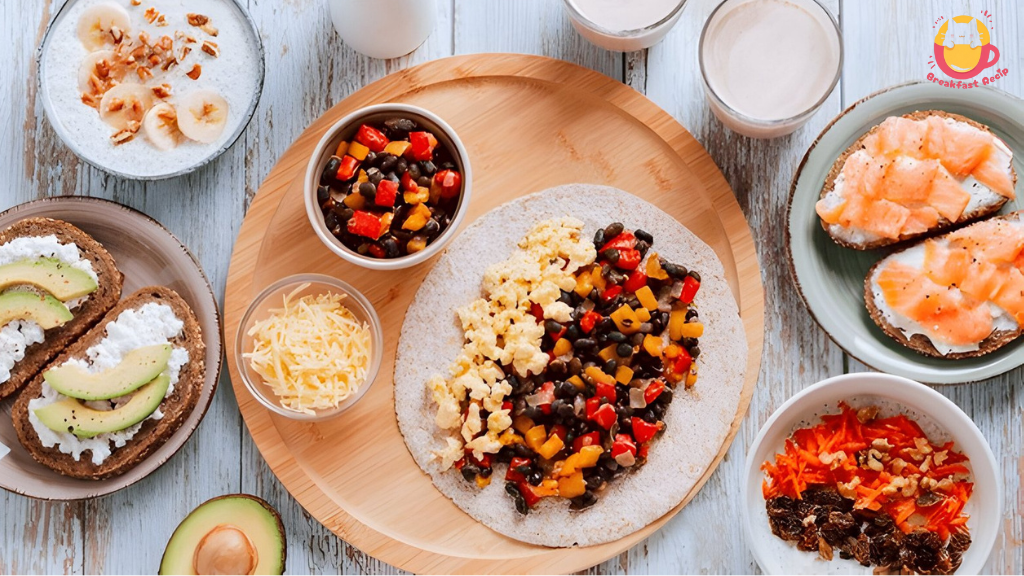
“Protein is the building block of our bodies, and starting the day with a protein-rich breakfast can set the tone for a productive and energized day ahead.”
Opt for High-Fiber Breakfast Options
Foods high in fiber, such as whole grains, fruits, and vegetables, are key for a healthy breakfast. They offer lasting energy and extra nutrients to start your day well.
Whole Grains for Sustained Energy
Adding whole grains to your breakfast keeps you full and gives you steady energy. Choose whole grain breakfast items like oatmeal, whole wheat toast, or quinoa porridge. These foods are digested slowly, avoiding energy drops that make you feel tired.
Fruits and Vegetables for Added Nutrition
Adding fruits and vegetables to your breakfast boosts its nutritional value. Fruits like berries and bananas, and veggies like spinach and tomatoes, are full of vitamins and minerals. Blend them into a smoothie or add them to an omelette for a tasty, healthy start.
| Whole Grain Breakfast Options | Fiber-Rich Fruit and Vegetable Options |
|---|---|
| Oatmeal Whole wheat toast Quinoa porridge Brown rice cereal | Berries (blueberries, raspberries, strawberries) Bananas Spinach Tomatoes Avocado |
“Fiber-rich foods like whole grains, fruits, and vegetables are the cornerstone of a nutritious breakfast. They provide sustained energy and essential nutrients to power you through the morning.”
Include Healthy Fats for Satiety and Nutrition
Healthy fats are key for a balanced breakfast. They make you feel full and give you the nutrients you need. Adding them to your morning meal can make it more nourishing and energizing.
Avocados, nuts, and seeds are great for healthy fats. Avocados, for example, are full of monounsaturated fats. These fats are good for your heart and can lower cholesterol. Try adding sliced avocado to your toast or blending it into a smoothie.
Nuts and seeds like almonds, walnuts, and chia seeds are also good. You can add them to oatmeal, yogurt, or enjoy them as a snack. They’re packed with healthy fats, protein, fiber, and other nutrients.
| Healthy Fat Source | Nutritional Benefits |
|---|---|
| Avocado | Monounsaturated fats, fiber, vitamins, and minerals |
| Almonds | Healthy fats, protein, fiber, and antioxidants |
| Chia Seeds | Omega-3 fatty acids, fiber, and protein |
| Walnuts | Anti-inflammatory omega-3s, protein, and fiber |
Try to include these healthy fats in your breakfast. Options like avocado toast, chia seed smoothies, or yogurt parfaits with nuts are great. They make your breakfast more satisfying and nutritious.
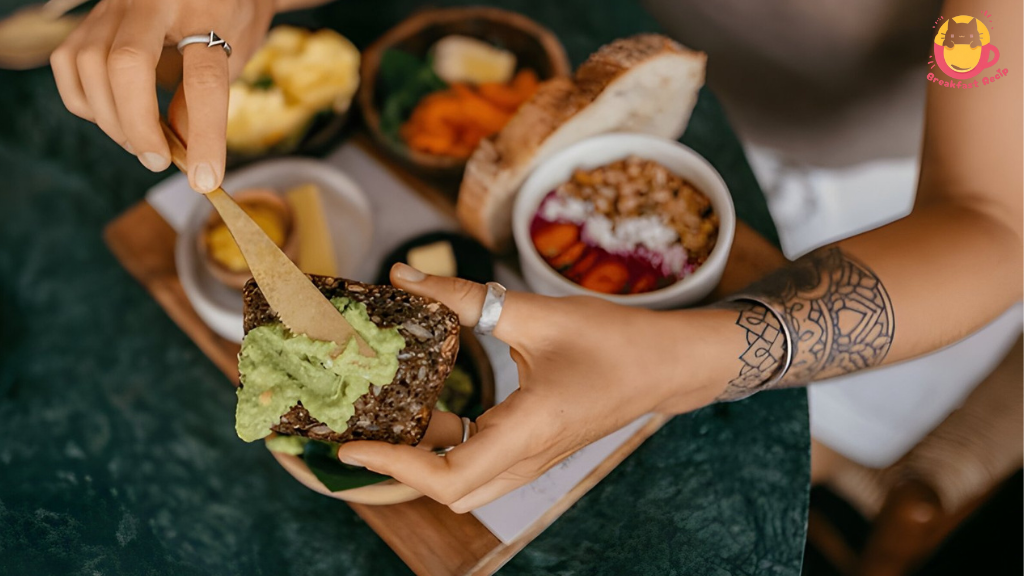
Portion Control: The Key to a Healthy Breakfast
Eating a healthy breakfast is not just about what you eat. It’s also about how much you eat. Portion control is key to making sure your breakfast helps your health and weight goals. By watching your portions, you can have a nutritious breakfast without overeating.
Using visual cues is a great way to control your portions. Picture your breakfast plate divided into four parts. Use one part for protein like eggs or lean meats. Another part is for complex carbs like whole grain toast.
The last two parts are for fruits and veggies. They add vitamins, minerals, and antioxidants to your meal.
Also, watch your portions of granola, nut butters, and dried fruits. They can be easy to eat too much of. Use measuring cups or spoons to keep your portions right.
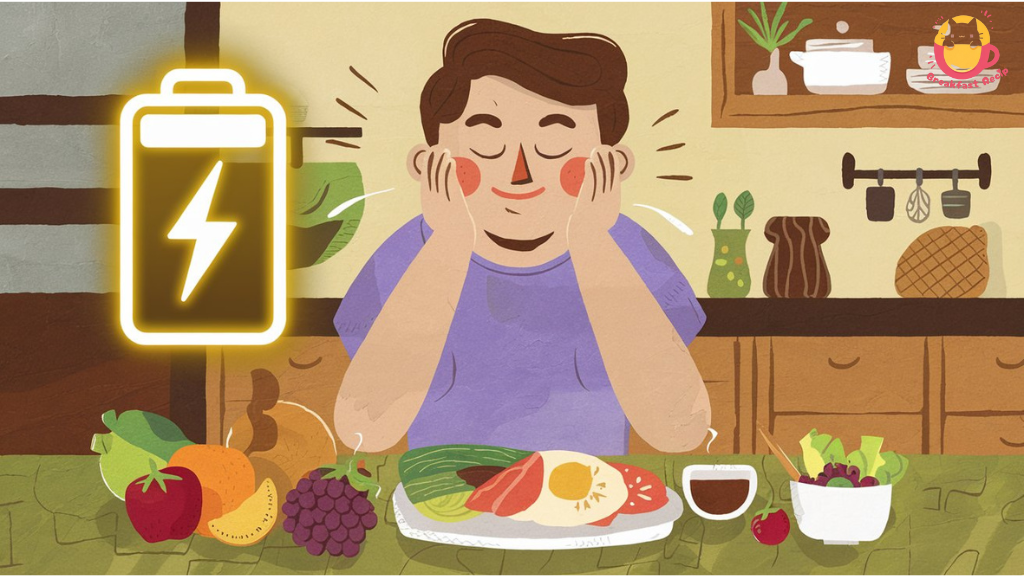
“The key to a healthy breakfast is not just what you eat, but how much you eat. Portion control is essential for maintaining a balanced and nutritious morning meal.”
By following these tips, you can make your breakfast healthier. Remember, being mindful of your portions is important for breakfast portion control and healthy breakfast for weight loss.
Complex Carbohydrates: The Foundation of a Balanced Breakfast
For a healthy and filling breakfast, focus on complex carbohydrates. Oatmeal and whole grain bread are great sources. They give us energy that lasts all morning.
Complex carbs are different from simple carbs. They’re full of fiber and digest slowly. This means you stay full and energized longer. They’re perfect for starting your day right.
Oatmeal: A Nutritious Start to the Day
Oatmeal is a top choice for breakfast. It’s full of complex carbohydrates, fiber, protein, and vitamins. Eating oatmeal gives your body the energy it needs for the morning.
Whole Grain Bread: A Versatile Breakfast Option
Whole grain bread is also a great source of complex carbohydrates. It’s good with avocado toast, breakfast sandwiches, or just with nut butter. The fiber and nutrients in whole grain bread keep you full until lunch.
Adding complex carbohydrates like oatmeal and whole grain bread to your breakfast is smart. They help you start your day feeling productive and full of energy. These foods are key to a balanced and healthy morning meal.
What Makes a Healthy Breakfast? Expert Tips and Recipes
As a professional copywriter, I’m excited to share expert tips and delicious recipes for a healthy breakfast. A nutritious morning meal is key for energy, brain function, and well-being. Let’s explore what makes a balanced breakfast that fuels your day.
Protein-rich foods are a hallmark of a healthy breakfast. Eggs, Greek yogurt, and lean meats like turkey or chicken boost energy and keep you full. Combine these with complex carbs like whole-grain toast or oatmeal for a satisfying start.
Fiber is also vital in a healthy breakfast. Foods high in fiber, like fruits, veggies, and whole grains, aid digestion and blood sugar control. Adding berries, spinach, or avocado to your breakfast boosts nutrients.
Healthy fats, found in nuts, seeds, and avocado, are crucial too. They aid in nutrient absorption, brain function, and satiety. This ensures you stay energized and focused in the morning.
It’s important to control your breakfast portions. A typical healthy breakfast might include:
- 1 cup of oatmeal with 1/2 cup of blueberries and 2 tablespoons of sliced almonds
- 2 eggs scrambled with 1/2 cup of spinach and 1 slice of whole-grain toast with 1 tablespoon of avocado
- 1 cup of plain Greek yogurt with 1/2 cup of mixed berries and 1 tablespoon of chia seeds
Balance, variety, and portion control are the keys to a healthy breakfast. By following these tips and recipes, you’ll fuel your body and mind for a productive day.
“Breakfast is the most important meal of the day, and a healthy one can set you up for success.” – Nutritionist Jane Doe
Quick and Easy Breakfast Ideas for Busy Mornings
If you’re always on the go, don’t worry. I’ve got some quick and easy breakfast ideas for you. Overnight oats and smoothie bowls are perfect when you’re short on time but want a healthy start.
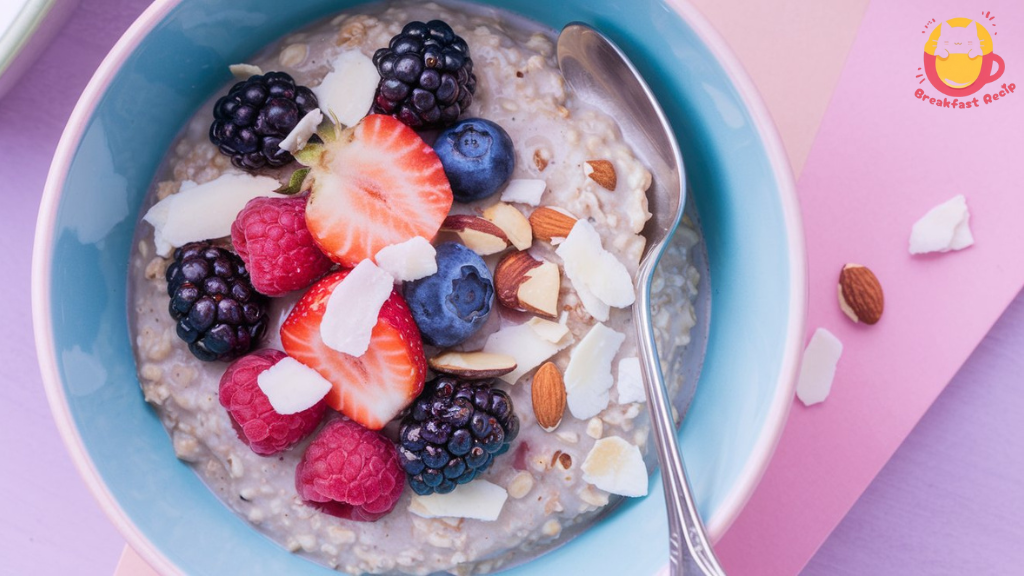
Overnight Oats and Smoothie Bowls
Overnight oats are a lifesaver. Just mix together oats, milk, chia seeds, and your favorite fruits or nuts. Let it sit in the fridge overnight. In the morning, you’ll have a tasty and filling breakfast.
For a fresh twist, try a smoothie bowl. Blend Greek yogurt, frozen berries, and add some granola on top. These ideas make sure you get the nutrients you need, even on the busiest days.
FAQ
What makes a healthy breakfast?
A healthy breakfast has foods like whole grains, lean proteins, and healthy fats. Add fruits or vegetables for extra nutrition. It should give you energy, keep you full, and support your health.
What are the benefits of eating a nutritious morning meal?
Eating a healthy breakfast boosts your energy and brain function. It also helps with weight management. The right mix of nutrients fuels your day and improves your well-being.
How can I incorporate more protein into my breakfast?
Protein is key for a healthy breakfast. Add foods like eggs, Greek yogurt, lean meats, and plant-based options like nut butter or legumes. They keep you full and satisfied.
What are some high-fiber breakfast options?
Whole grains, fruits, and vegetables are great for fiber. They give you energy and add nutrients to your breakfast.
How can I include healthy fats in my breakfast?
Healthy fats from avocados, nuts, and seeds are easy to add to breakfast. They help you feel full and support your health.
What is the importance of portion control for a healthy breakfast?
Controlling your portions is key for a healthy breakfast. It helps you avoid too many calories and supports your health and weight goals.
How can complex carbohydrates contribute to a balanced breakfast?
Complex carbs like oatmeal and whole grain bread are the base of a balanced breakfast. They give you energy and support your health.
What are some quick and easy breakfast ideas for busy mornings?
For busy mornings, try overnight oats or smoothie bowls. They’re easy to make ahead and still packed with nutrition.

